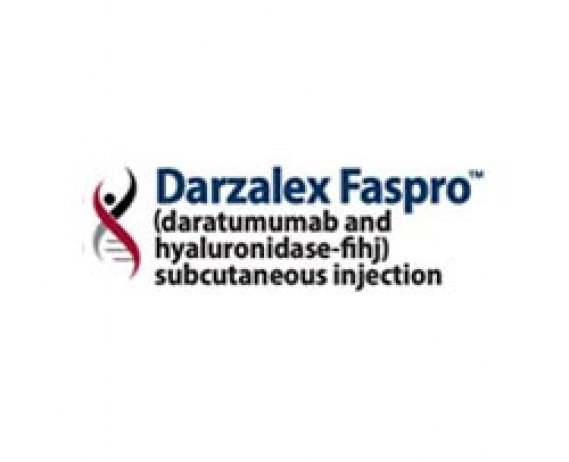Visit DARZALEX® (daratumumab) for more information about this drug’s original formulation and its intravenous (IV, into the vein) administration.
What Is Darzalex Faspro?
Darzalex Faspro®, a combination of Darzalex and hyaluronidase (an endoglycosidase), is a formulation given as an abdominal injection under the skin (subcutaneous, SQ) to treat adult patients with multiple myeloma. It has been determined to be as effective as the original formulation of Darzalex. Switching from IV to SQ must first be discussed with your doctor.
Who Is a Candidate for Darzalex Faspro?
Darzalex Faspro is used in myeloma as part of the following treatments:
- In combination with Velcade® (bortezomib), melphalan, and prednisone (DVMP) in newly diagnosed patients who are ineligible for autologous stem cell transplant (ASCT).
- In combination with Revlimid® (lenalidomide) and dexamethasone in newly diagnosed patients who are ineligible for ASCT, and in patients with relapsed and refractory myeloma who have received at least one prior therapy.
- In combination with Velcade, thalidomide, and dexamethasone in newly diagnosed patients eligible for ASCT.
- In combination with Velcade and dexamethasone in patients who have received at least one prior therapy.
- In combination with Pomalyst® and dexamethasone in patients who have received at least one prior line of therapy including Revlimid and a proteasome inhibitor.
- As monotherapy in patients who have received at least 3 prior lines of therapy, including a proteasome inhibitor and an immunomodulatory drug, or who are double-refractory (no longer responded) to a proteasome inhibitor and an immunomodulatory drug.
How Is Darzalex Faspro Given?
Darzalex Faspro is given by a healthcare professional as an abdominal SQ injection that takes only a few minutes (3-5 minutes). The dose is 1,800 mg of daratumumab plus 30,000 units hyaluronidase. Medications may be given before and after each injection to help prevent a reaction.
What Are the Possible Adverse Events to Darzalex Faspro?
The most common hematological (blood) abnormalities in laboratory tests (greater than or equal to 40%) with Darzalex Faspro are decreased leukocytes, decreased lymphocytes, decreased neutrophils, decreased platelets, and decreased hemoglobin. Your doctor will monitor your blood counts.
What Are the Most Common Side Effects with Darzalex Faspro?
The most common side effects (greater than or equal to 20%) with Darzalex Faspro are:
- With monotherapy: Upper respiratory tract infection.
- With combination therapy: Fatigue, nausea, diarrhea, shortness of breath, trouble sleeping, fever, cough, muscle spasms, back pain, vomiting, cold-like symptoms (upper respiratory tract infection), peripheral neuropathy (nerve damage causing tingling, numbness, or pain), constipation, and lung infection (pneumonia).
Special Precautions with Darzalex Faspro
- Hypersensitivity: Your doctor will discontinue Darzalex Faspro for life-threatening reactions.
- Neutropenia (low neutrophils in the blood): Your doctor will monitor your complete blood cell counts during treatment, and monitor for signs of infection.
- Thrombocytopenia (low levels of platelets): Your doctor will monitor your complete blood cell counts during treatment.
- Embryo-fetal toxicity: Darzalex Faspro can cause fetal harm. Females of reproductive potential should use effective contraception.
- Interference with cross-matching and red blood cell antibody screening: Your doctor will type and screen you prior to starting treatment. Blood banks should be informed that you have received Darzalex Faspro.
Janssen CarePath Program
Please call 1-844-553-2792 or visit the Janssen CarePath Program website for more information.
The International Myeloma Foundation medical and editorial content team
Comprised of leading medical researchers, hematologists, oncologists, oncology-certified nurses, medical editors, and medical journalists, our team has extensive knowledge of the multiple myeloma treatment and care landscape. Additionally, Dr. Brian G.M. Durie reviews and approves all medical content on this website.
Last Medical Content Review: August 31, 2021







